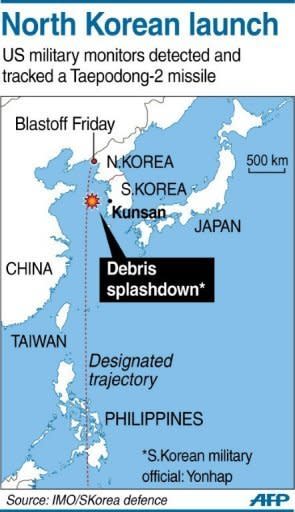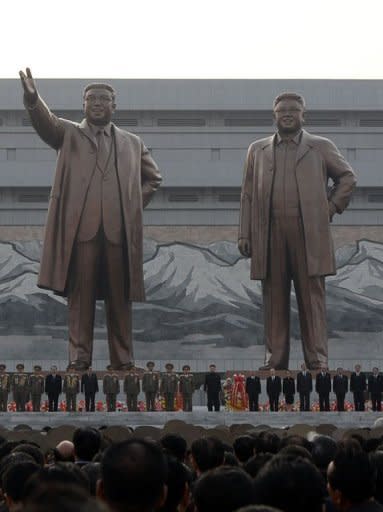North Korean rocket launch fails, draws condemnation
North Korea's heralded long-range rocket test ended in failure Friday, disintegrating in mid-air soon after blast-off and plunging into the sea in a major embarrassment for the reclusive state. The defiant launch drew condemnation from world leaders who described it as a "provocative" act that threatened regional security, despite Pyongyang insisting it was intended to put a satellite into orbit for peaceful purposes. Some four hours after the rocket exploded over the Yellow Sea, the North admitted the satellite had failed to enter orbit, and that "scientists, technicians and experts are now looking into the cause of the failure". The United States and its allies slammed the exercise as a disguised ballistic missile test that contravened United Nations resolutions triggered by Pyongyang's two nuclear tests. "North Korea is only further isolating itself by engaging in provocative acts, and is wasting its money on weapons and propaganda displays while the North Korean people go hungry," White House spokesman Jay Carney said. He said the launch "violates international law and contravenes its own recent commitments", under which Pyongyang had agreed to suspend its nuclear and missile tests in return for US food aid. UN chief Ban Ki-moon condemned the launch as "deplorable", saying it "defies the firm and unanimous stance of the international community". South Korea's defence ministry said the rocket lifted off at 07:39 am (2239 GMT Thursday) and flew for just over two minutes before it "splintered into two parts, probably due to a blast", and then broke into smaller pieces. The debris fell into the Yellow Sea off South Korea and its navy launched a salvage operation to retrieve the debris, despite warnings from Pyongyang last week not to attempt such an operation. The South said it was keeping a close eye on the North "for further provocative acts such as missile tests and a nuclear test" as analysts said the humiliation could spur Pyongyang to hold a third atomic test. The European Union joined governments in Japan and South Korea in condemning Friday's move as a provocation that undermined peace and security in the volatile Korean peninsula and the wider region. The North's sole major ally, China, was more muted in its reaction, calling for restraint from all sides and saying it had not been given advance warning of the launch. The test was supposed to have been the centrepiece of weekend commemorations to mark the centenary of the birth of North Korean founding leader Kim Il-Sung as Pyongyang cements the rule of Kim Jong-Un, who took over in December. State television showed Jong-Un waving at crowds of tens of thousands of people in the capital late Friday as he led a ceremony unveiling giant new statues of his father and grandfather. Soldiers in broad-brimmed caps sporting chestfuls of medals, men in suits and ties and women in traditional hanbok gowns watched as civilians applauded and waved bunches of artificial flowers at intervals throughout the ceremony. Fireworks and shouts of "Manse!" (hurrah) marked the end of the event. Jong-Un, the third leader in the Kim dynasty, has been awarded an array of official titles since succeeding his father, including on Friday the post of first chairman of the powerful defence commission. Up to 200 foreign journalists invited to North Korea for the launch were taken by surprise as news emerged of the blast-off of the 30-metre (100-foot) Unha-3 (Galaxy-3) at a newly built space centre on the northwest coast. A specially outfitted media centre at their Pyongyang hotel was almost empty when the news broke from Seoul early Friday, and a huge white screen erected there remained blank. Analysts said the failed launch was a setback for the untested Kim Jong-Un, who is in his late 20s, and a threat to attempts to build his credibility. "Obviously the rocket launch is pretty embarrassing for Kim Jung-Un and North Korea," said Tate Nurkin, managing director at leading defence publication IHS Jane's. "The timing of it is significant. North Korea is all about ceremony and stature and grand, symbolic gestures." Analysts say satellite imagery shows what looks like preparations for a third nuclear test, which could be imminent in an attempt to restore national pride. The communist regime's previous patterns of behaviour have seen missile tests followed by bomb tests. "It would be easy to gloat, but paradoxically, the missile failure may have actually increased the danger the world faces," said Marcus Noland of the Washington-based Peterson Institute for International Economics. The Group of Eight powers said they would consider taking "appropriate actions" at the UN Security Council, which "deplored" the attempted rocket launch but stopped short of an outright condemnation. Observers say the 15-member Security Council is unlikely to order immediate new sanctions against North Korea, as fears of a new nuclear test have clouded diplomatic outrage. "We have to hold our fire. This was bad, but we have to expect worse to come," said one senior UN envoy. The North, which is believed to have enough plutonium for six to eight bombs, tested atomic weapons in October 2006 and May 2009. Both were held one to three months after missile tests.




